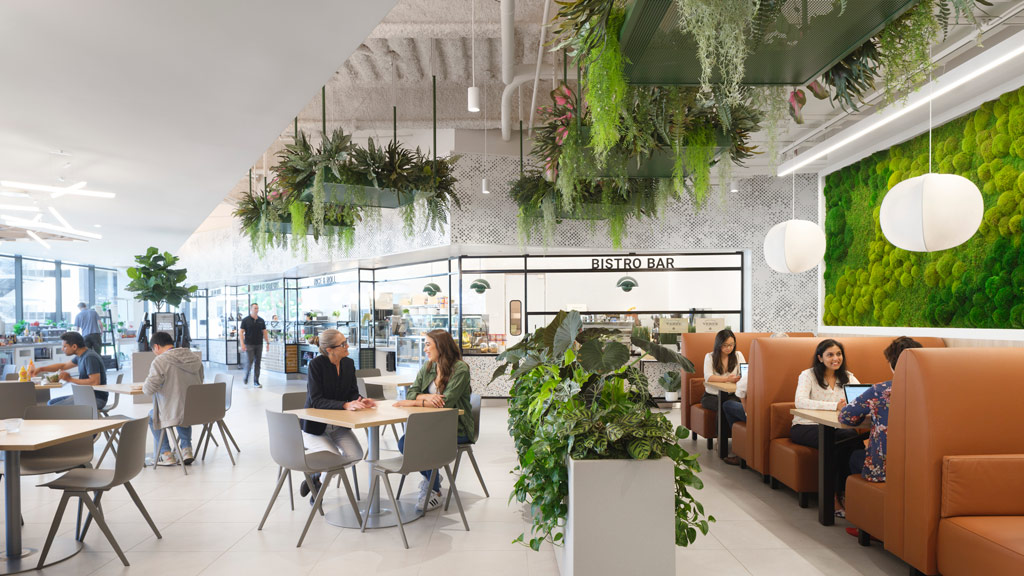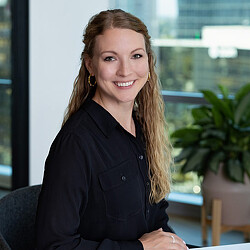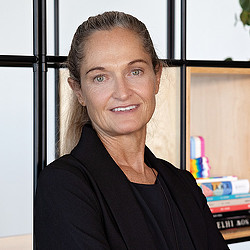Five Benefits of Leaning into Brand Identity and Culture for Office Design
September 12, 2024 | By Katie Kaiser and Jacqueline Zuhoski
In an evolving world of work, the role and function of the office is constantly being reevaluated. Adjusting to a hybrid environment has presented challenges, especially creating in-person experiences that engage employees and drive their desire to be at the office more. More than just a place for free snacks and after work happy hours, modern workplaces must reflect their employees and their shifting preferences while embodying company values.
Our client, Synopsys, is much more than a tech company. They deliver leading silicon to systems design solutions from electronic design automation to silicon IP and systems, that accelerate technology innovation.
The company’s future-forward ethos extends to a commitment to inclusivity, sustainability, the growth and wellness of its people, and endless innovation.
With this in mind, our approach to the design of the Synopsys’ new office, part of its Sunnyvale, California campus, was intentional, recognizing the power design holds in mirroring companies’ identities and philosophies. Our collective vision manifested in an environment that emulates the heart and soul of Synopsys’ brand, is representative of its local workforce, and ignites purpose, fulfillment, and connectivity.
We spoke with Mike Huaco, Senior Vice President of Global Workplace Resources at Synopsys, to better understand how the company has benefited from a workplace designed that brings its core priorities and identity to life.
A Sense of Ownership Yields Greater Employee Satisfaction
For Synopsys, providing its employees with the opportunity to be involved early in the design process was a powerful way to ensure their voices were taken into consideration. A key group of its workforce was engaged in interviews during the pandemic to determine which factors were most important in the design direction. Interview findings showed a clear rise in the desire for more warmth, a variety of meeting and collaboration spaces, and plants… a lot of plants! After being home for about two years, it was clear that employees were looking for something different in their workspace. This is just one example of the company’s broader efforts to gain a better understanding of the impact of workplace design. For other projects, Synopsys collected global input through Gensler’s Workplace Performance Index (WPIx), allowing leadership to leverage insights to help measure office space performance and confidently plan for the future.
This type of involvement is gaining traction among large companies like Synopsys and is a simple way to gather powerful insights that can enhance the employee experience and establish brand differentiation. It is also an effective means to drive motivation and instill pride among employees by seeing themselves reflected in the design of their place of work, where they spend a substantial amount of time.
Eliciting employee feedback is also an extension of the company’s broader diversity and inclusion initiatives, supporting Synopsys’ belief in celebrating a range of perspectives and nurturing a culture of trust. “Our workplace experience is designed around the employee, driving engagement, inclusion, and productivity,” Huaco says.
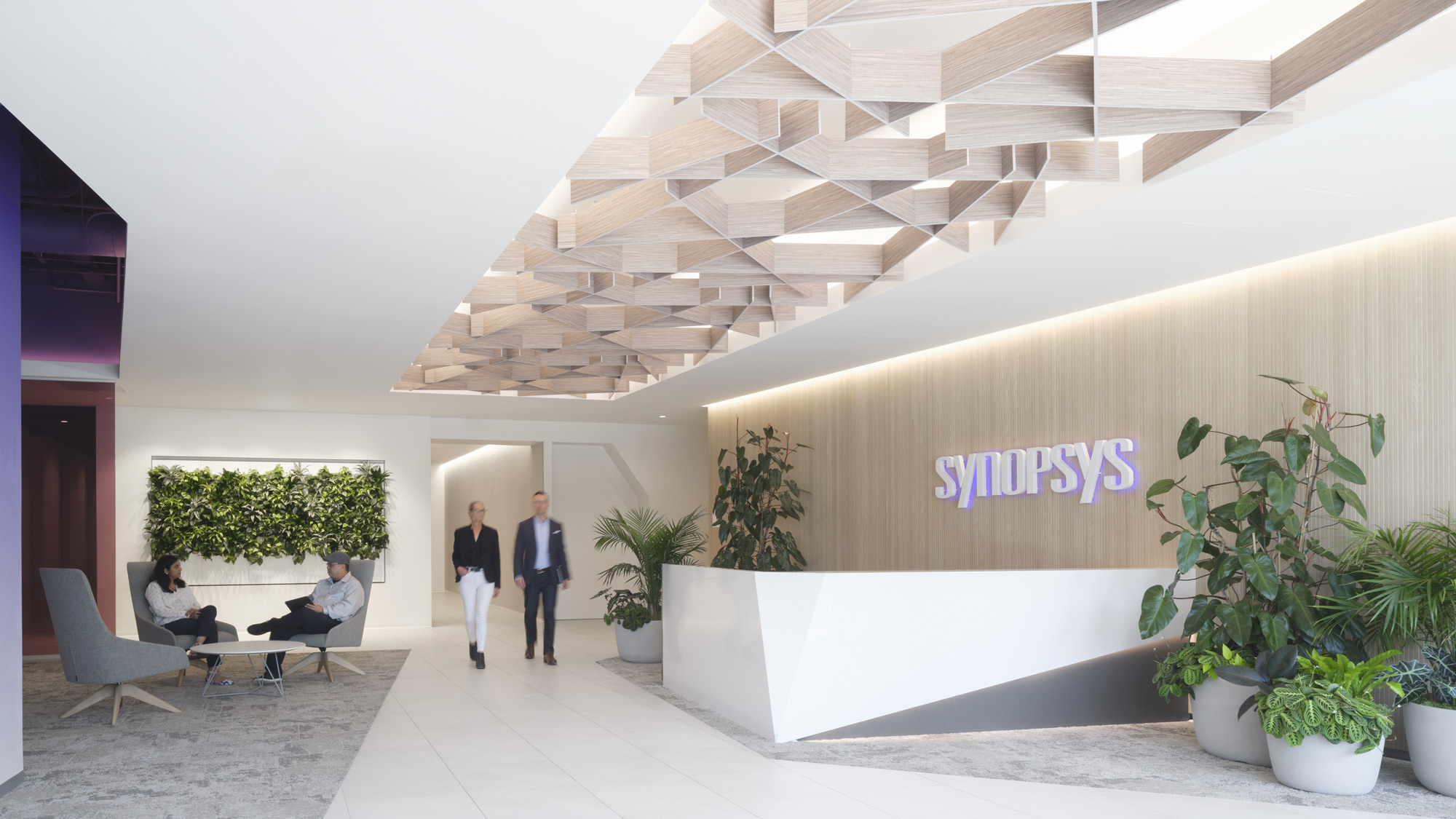
The Future isn’t Smart if it’s not Sustainable
Synopsys is leading the way to the Era of Pervasive Intelligence, and it exists to power innovation today that ignites the ingenuity of tomorrow. While advancements in technology will get us closer to this future, the company believes we won’t fully realize this vision if we don’t simultaneously prioritize sustainability.
Reducing its environmental impact is in Synopsys’ DNA. The company was insistent on certification before it was commonly pursued in the industry, and former CEO Aart de Geus was adamant about sustainability and biophilia being a core focus of Synopsys’ real estate portfolio.
These precedents have carried over into everything the company does, including the design and function of its new workplace. In line with the company’s efforts to support the transition to a low-carbon economy, this space’s operational carbon metrics are recorded so it can track and identify areas of improvement. The company is also actively looking to WELL certification for future projects.
Cumulatively, these measures send a powerful message to employees, putting intention into action and living a real commitment to a core Synopsys value and priority. It also demonstrates genuine care for the wellbeing of its team, says Huaco. “Sustainability is integral to improving employee health and wellness, thus making it a key focus of the overall Synopsys workplace experience.”
Curated Collaboration Spaces Drive Connectivity and Productivity
Moving into a brand-new space can be daunting, which motivated our clients to take proactive measures to ensure employees were comfortably navigating through and working in this new office together. Observational visits were conducted to evaluate how teams were acclimating and how different spaces were being used, and it was evident this adjustment boosted comradery and connection.
Moving from a more traditional office setting to a future-forward environment was a significant but welcome shift for the Synopsys team. More conducive to current ways of working, collaboration and connectivity are supported by flexibility and choice. Dedicated spaces for teamwork are catalysts for productivity, enabling employees to do their best work.
Suiting the varying needs of the different business groups at Synopsys’, the company’s newest Sunnyvale office offers a sense of surprise and delight, helping boost engagement and display a culture of continuous learning and curiosity.
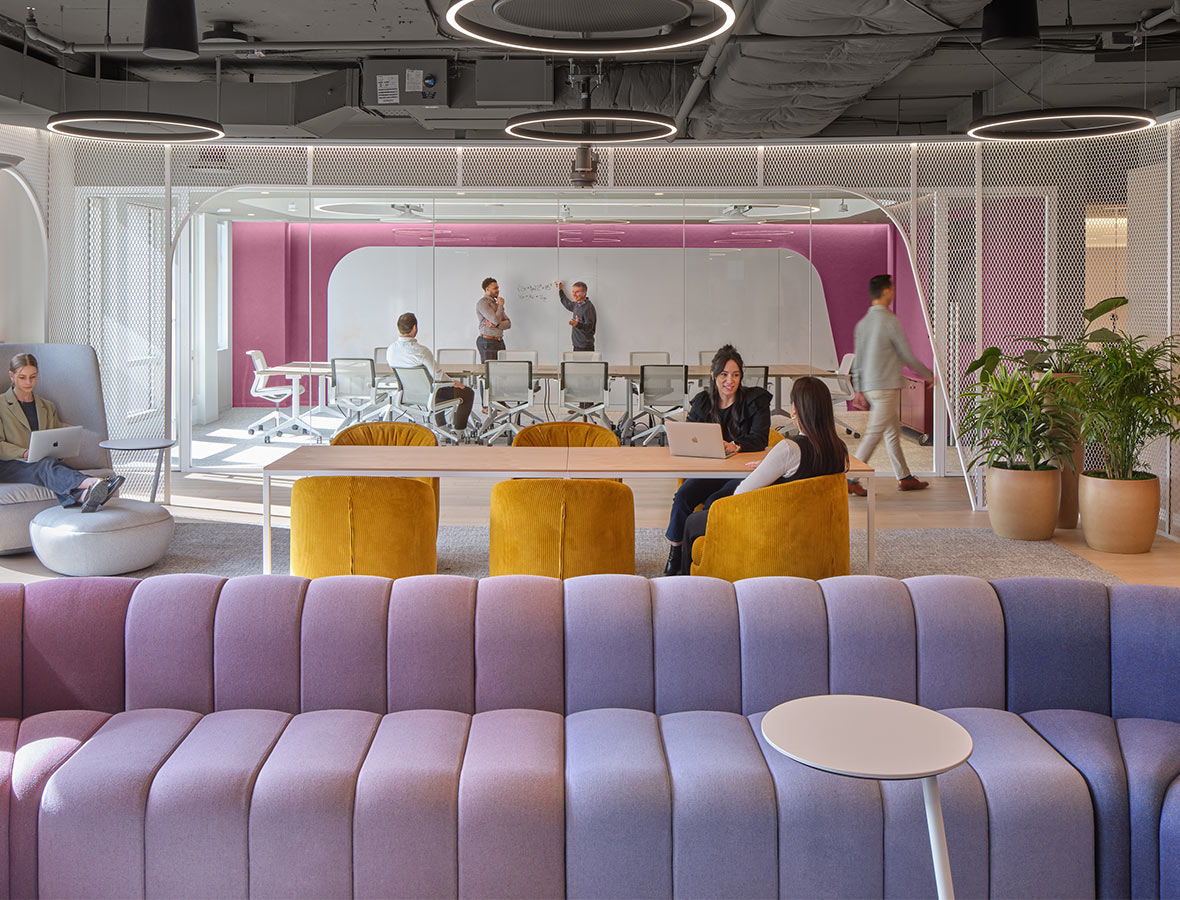
Designing for Total Wellbeing
Wellness in the workplace has always been critically important, but perhaps even more so emerging from years of largely isolated remote work. Recognizing the power and impact design has on influencing wellbeing, we worked with Synopsys to bring a human-centered vision to life.
With so much time spent indoors during the workday, visual connections to nature became central elements in the design of this space due to their positive correlation with health and creativity. Our team looked at several plant walls, aiming to find low-maintenance options. We decided to bring Biome into the fold, a developer of smart living wall products that take care of themselves. Biome’s technology not only waters plant walls on its own, but also takes readings of the environment to measure air quality. It then sends water alerts and air reports, with software automatically updating and adapting its settings to its surroundings. Synopsys was drawn to the idea of using a data-driven solution that aligns with its mission of building a smart, sustainable future.
Complex, yet clear, planning for floors and non-linear hallways are always necessary at Synopsys, so we ensured biophilic patterns were carefully worked into our planning and into graphics and finishes throughout the office.
Dedicated wellness rooms are sprinkled throughout the building, ensuring equal access for teams distributed across floors. A fitness center, completed just before the pandemic, is a short walk from this building, encouraging active, healthy lifestyles.
Thoughtfully planned and designed spaces, that support mental and physical health, help meet a key need and expectation among today’s office workers.
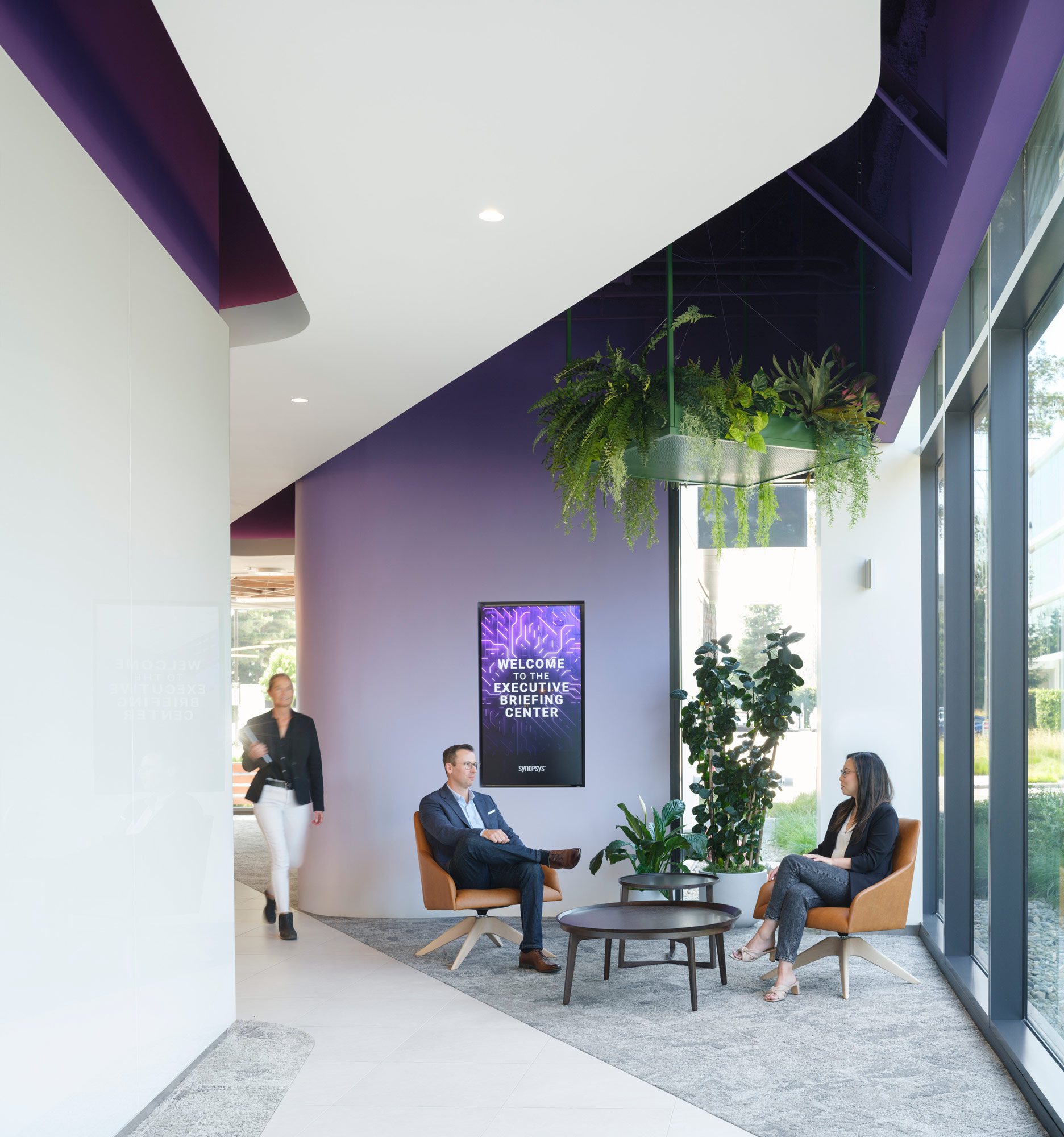
Continuing Synopsys’ Legacy of Innovation Leadership
In addition to its status as an employer that is in tune with employee needs, Synopsys has a legacy of pioneering new technologies. Designing the company’s workplace presented an opportunity to showcase this history of invention.
The team prototyped new furniture and new types of spaces to allow for continued experimentation and examination, informing which layouts are optimal and which modes of work could be embraced and accommodated in a given setting. Specifically, testing contemporary furniture was new to Synopsys, but ultimately recognized as necessary to push the boundaries of team connection in support of continued company breakthroughs.
With nearly 70 percent of its staff back in the office per week, greater opportunity for teamwork in methodically created spaces is fueling curiosity and maximizing productivity. This type of office also bolsters efficiency, essential in driving better business outcomes.
An Authentic Workplace Pays Dividends
Effectively designed spaces that exemplify a brand’s identity have far-reaching benefits for teams and businesses. Investing in creating a great workplace experience can go a long way in uniting teams, boosting employee satisfaction, enhancing effectiveness, and meeting business needs. A novel, memorable design unique to a specific brand can also support the attraction and retention of top talent, and in this case, reinforces Synopsys’ standing as a sought-after employer.
The company’s new office is a significant differentiator in a crowded tech locale, highlighting its storied history of innovation and leadership of the Era of Pervasive Intelligence.,
As Huaco said, “The workplace plays a pivotal role in the employee experience, reflecting the brand and cultural values."
For media inquiries, email .
